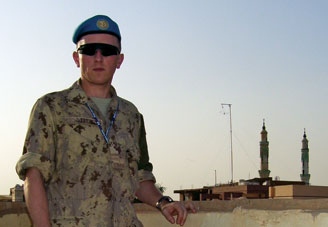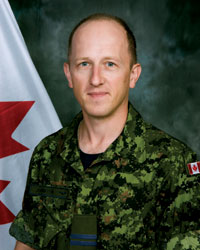
Recently assigned to the United Nations Mission in Sudan, Captain Lennard Johnston is a dedicated military soldier and lifelong member of The Salvation Army.
Salvationist.ca interviewed Captain Johnston by radio hook-up in the Sudanese capital of Khartoum, where he was stationed.
Tell us a little bit about yourself.
I was born and raised in Barrie, Ont. I joined the Canadian Armed Forces in 1986 and attended Royal Roads Military College in Victoria. Wherever I was posted, I sought out Salvation Army corps, in Portage La Prairie, Man., Moose Jaw, Sask., Dartmouth, N.S., Victoria and then back in Barrie.
Why did you join the Canadian Armed Forces?
Uncles on both sides of the family were in the military, so I guess it runs in the family. Living next to Canadian Forces Base Borden, I’d watch the jets take off and land, and I joined the Air Cadets at 13. I spent the first part of my career flying Sea King helicopters. Flying is in my blood.
In 1997, I left the regular Forces, became a full-time reservist back in Barrie, and worked as a Salvation Army corrections officer.
What made you join the UN mission?
In March of 2006, the military sent out an e-mail asking for volunteers for the UN mission in Africa. Helping the people of Africa had been pulling at my heart for a couple of years, so I jumped at the opportunity. When I got the e-mail, I knew I had to try to help.
What do your present duties entail?
I’m here to support the United Nations Mission in Sudan (UNMIS). I trained to be a United Nations Military Observer (UNMO). The job of a UNMO is to observe, report and verify information. However, due to the shortage of experienced staff officers, I am working as an air operations officer. I oversee the 42 aircraft assigned to the mission, from tankers to fighter planes. It’s an important task given the geography of Sudan, a country the size of Ontario and Quebec put together. Air mobility is paramount here given the lack of roads and swampy terrain in the central part of the country. I’m permanently based here at headquarters in Khartoum but they send me where I am needed.
 Do you see a contradiction in being a Salvationist and a member of the Canadian Armed Forces?
Do you see a contradiction in being a Salvationist and a member of the Canadian Armed Forces?
I don’t. Before I joined the Forces, I read my Bible, prayed and talked to my corps officers. Soldiering is in my blood but I’m a Salvationist at the same time.
In the Bible, while many refused to believe in Jesus, it was the Roman centurion—the ancient equivalent to a modern-day company commander—at the cross who said, “Surely this man was the Son of God!” (See Mark 15:39.) I can identify with such unflinching belief.
So I don’t have any problems, especially with this UN mission, where we are out helping people.
Do you have any support from your Salvation Army corps back home?
They’ve been fantastic! They are constantly praying for me and they send cards and letters inquiring about my welfare. As well, I send a weekly e-mail explaining what I am doing. I’ve been told that the corps officers in Barrie and Vicoria post it on their church bulletin boards.
Do you get a chance to minister to your fellow soldiers?
I’ve done that my entire career. An obvious starting point has been the fact that I’m a teetotaller. Whenever the topic comes up and my friends ask why I don’t drink alcohol, I tell them it’s part of my faith, it’s part of my church. Many fellow soldiers will approach me with their problems even though it’s not part of my job. Though I don’t necessarily preach the gospel using words, my actions shine through.
Since this interview took place, Captain Johnston has returned to Canada to his former posting at CFB Borden, where he is also the 16 Wing ethics co-ordinator.
He recently became engaged to a university professor he met while attending the International Symposium on Military Ethics in San Diego.
“Life has been good since I returned home,” he reports. “Not a day goes by where I am not reminded of how blessed we are in Canada.”
Top photo: Cpt Johnston on the roof of the Canadian UNMO residence in Khartoum, Sudan